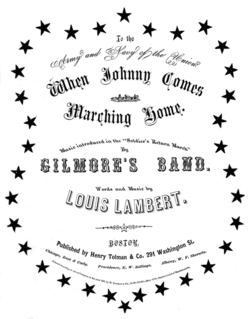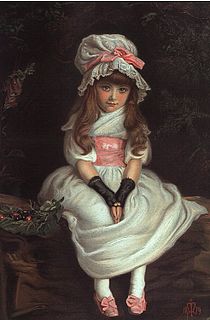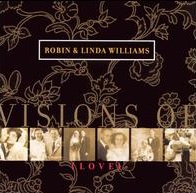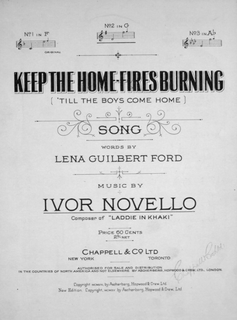
Ivor Novello, born David Ivor Davies, was a Welsh composer and actor who became one of the most popular British entertainers of the first half of the 20th century.
"Mademoiselle from Armentières" is an English song that was particularly popular during World War I. It is also known by its ersatz French hook line, Hinky Dinky Parlez-vous.

"It's a Long Way to Tipperary" is a music hall song written by Henry James "Harry" Williams and co-credited to Jack Judge. Originally it was credited as written by Jack Judge and co-credited to Henry James "Harry" Williams. It was allegedly written for a 5-shilling bet in Stalybridge on 30 January 1912 and performed the next night at the local music hall. Now commonly called "It's a Long Way to Tipperary", the original printed music calls it "It's a Long, Long Way to Tipperary". It became popular among soldiers in the First World War and is remembered as a song of that war.

The "Battle Cry of Freedom", also known as "Rally 'Round the Flag", is a song written in 1862 by American composer George Frederick Root (1820–1895) during the American Civil War. A patriotic song advocating the causes of Unionism and abolitionism, it became so popular that composer H. L. Schreiner and lyricist W. H. Barnes adapted it for the Confederacy.

"When Johnny Comes Marching Home" is a popular song from the American Civil War that expressed people's longing for the return of their friends and relatives who were fighting in the war.

"Over There" is a 1917 song written by George M. Cohan, that was popular with the United States military and public during both world wars. It is a patriotic song designed to galvanize American young men to enlist in the army and fight the "Hun". The song is best remembered for a line in its chorus: "The Yanks are coming."

"Aura Lea" is an American Civil War song about a maiden. It was written by W. W. Fosdick (lyrics) and George R. Poulton (music). The melody was used in Elvis Presley's 1956 hit song "Love Me Tender".

Cherry Ripe is an English song with words by poet Robert Herrick (1591–1674) and music by Charles Edward Horn (1786–1849) which contains the refrain,
Cherry ripe, cherry ripe,
Ripe I cry,
Full and fair ones
Come and buy.
Cherry ripe, cherry ripe,
Ripe I cry,
Full and fair ones
Come and buy.
"The Army Goes Rolling Along" is the official song of the United States Army and is typically called "The Army Song". It is adapted from an earlier work titled the "U.S. Field Artillery March".
"I'll Walk Alone" is a 1944 popular song with music by Jule Styne and lyrics by Sammy Cahn. The song was written for the 1944 musical film Follow the Boys, in which it was sung by Dinah Shore, and was nominated for the Academy Award for Best Original Song but lost to “Swinging on a Star”. Shore also released the song as a single which became her first #1 hit on the Billboard charts.
A war song is a musical composition that relates to war, or a society's attitudes towards war. They may be pro-war, anti-war, or simply a description of everyday life during war times.
"Follow the Colours" is a marching song written by the English composer Edward Elgar in 1907, with words by Capt. William de Courcy Stretton. The song is for solo voice with an optional chorus of male voices.

Visions of Love is the last album of duo Robin and Linda Williams on the Sugar Hill Records label, released in 2002. They would move to Red House Records for their next release.
Keep the Home Fires Burning may refer to:

We'll Gather Lilacs, also called We'll Gather Lilacs In The Spring, is a song by Welsh composer Ivor Novello which he wrote for the hit musical romance Perchance to Dream. The stage musical opened at the Hippodrome Theatre in London's West End in 1945 and ran until 1948. The song, sung in the show by Olive Gilbert, was the most popular and enduring to emerge from the production.
It was originally recorded by Muriel Barron & Olive Gilbert (1945) and by Geraldo and his Orchestra, who reached the UK charts with it in 1946. A recording by Tommy Dorsey and His Orchestra was a minor hit in the USA in 1946. It has since been performed by many artists, including notably Anne Ziegler and Webster Booth, Richard Tauber, Bing Crosby, Frank Sinatra (for his album Sinatra Sings Great Songs from Great Britain, Marion Grimaldi and Julie Andrews.

Lena Guilbert Brown Ford, middle name sometimes listed as Gilbert, was a lyricist, best known for "Keep the Home Fires Burning" which she wrote during the First World War.

"Your King and Country Want You" was a British popular song, with both words and music by Paul Rubens. It was published in London in 1914, at the start of the First World War, by Chappell Music. It was written as a "Woman's Recruiting Song" to be sung with the intention of persuading men to volunteer to fight in the War. The profits from its sale were to be given to "Queen Mary's Work for Women Fund". The song raised over half a million pounds for the fund.
The music of World War I is the music which was composed during the war or which is associated with it.

Keep the Love-Light Burning in the Window Till the Boys Come Marching Home is a World War I song with music and lyrics by Jack Caddigan and Jimmy McHugh. It was first published in May, 1917, a month after the United States entered World War I, by D. W. Cooper Publishing Co., in Boston, MA. By October, Chappell & Co. had brought suit, alleging that the title and refrain violated copyright on the British song, "Keep the Home-Fires Burning." Cooper settled out of court by agreeing to release a second edition, copyrighted October 23, 1917, with revised lyrics and the title "Keep the Love-Light Shining in the Window." In the meantime, Jos. W. Stern & Co. had acquired sole selling rights, and its imprint, along with Cooper's, appeared on the new version. A final edition, issued after Stern & Co. actually acquired the copyright, appeared in 1918.
This is a summary of 1916 in music in the United Kingdom.













